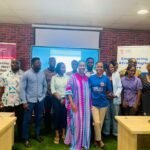The CEO of Telecel Ghana, Ing. Patricia Obo-Nai, has declared that the key to accelerating Africa’s development through digital innovation is partnerships for the creation and implementation of digital public infrastructure, consistent investment in start-up innovations to scale, and skillfully designed digital literacy programs to drive digital adoption throughout the continent.
She was giving the opening keynote speech at the Mobile Technology for Development (MT4D) event, which was a part of the 3i Africa Summit that concluded in Accra.
“Digital Infrastructure and Innovation: Accelerating Africa’s Development” was the topic of the CEO of Telecel Ghana’s speech.
She noted that in order to close the massive gap in connectivity and accessibility across the continent, African nations now have a great opportunity to develop resilient, equitable, and inclusive digital infrastructure. This is thanks to the post-Covid-19 era.
She cites data from the GSMA 2023 Report on internet connectivity in Sub-Saharan Africa, which shows that only 25% of Africans have access to the internet, 15% do not even have coverage, 59% have coverage but are not connected, and 40% do not own the necessary devices to connect, despite living in areas with coverage.
However, Patricia Obo-Nai pointed out that in addition to mobile coverage, the infrastructure required to narrow the connectivity gap also includes data centers, inland and underwater fiber, and—perhaps most importantly—reliable energy, which is sometimes left out of the equation.
“It is also important that we have resilient and future proof infrastructure to prevent the kind of outage we experienced recently when the undersea cables were damages,” said.
Partnerships
“The only way we can close the gap effectively is co-investing and infrastructure sharing,” the speaker stated, despite the fact that individual operators like Telecel and others are contributing to the construction and deployment of the necessary infrastructure.
She mentioned that the World Bank projects that by 2030, Africa would require US$109 billion to address the digital infrastructure gap, emphasizing that collaboration is necessary and that neither operator or government can achieve this goal on their own.
“Where is the money going to come from as private investment is stalling, foreign donors are localizing their funding to their home countries and African governments’ budgets are also tightening. Broad partnerships between governments and private sector players is the way to go,” she said.
Supporting start-up innovations to scale
According to Patricia Obo-Nai, Africa has the world’s greatest unrealized potential for digital innovation, with projections from the World Bank indicating that the continent’s digital economy might reach US$180 billion by 2025.
The problem, according to her, is that many of the fintech breakthroughs coming out of Africa are not getting the funding they need to grow, despite the continent having some of the best minds in the world.
We’re terrific at starting digital companies, which is fantastic, but I’m sick of seeing friends and relatives put money into these kinds of businesses. In order for us to capitalize on those ideas and speed our own development, we must identify talent and make significant investments in it to scale,” the speaker stated.
Driving Adoption and Inclusivity
Patricia Obo-Nai added that promoting the innovation’s acceptance and use throughout the continent in order to address the inclusion issue would be the third piece of the puzzle.
She mentioned that the World Bank projects that by 2035, there would be 450 million people working in Africa, of whom just a small proportion will have steady jobs.
It would take a purposeful and consistent rollout of digital literacy programs like coding, digital marketing, data analytics, machine learning, and others to give African youth the digital skills they need to be employable in the future. She believes that there are great opportunities in digital innovation to close the expected unemployment gap.
“Let’s not just discuss these issues – let’s implement, implement and implement – and we need to do this with speed – that is the only way we can realize the desired accelerated development,” Patricia Obo-Nai stated.
Watch the full video below:






 /home/afripjzx/technewsglobal.net/wp-content/themes/foxiz/templates/popup.php on line 167
/home/afripjzx/technewsglobal.net/wp-content/themes/foxiz/templates/popup.php on line 167